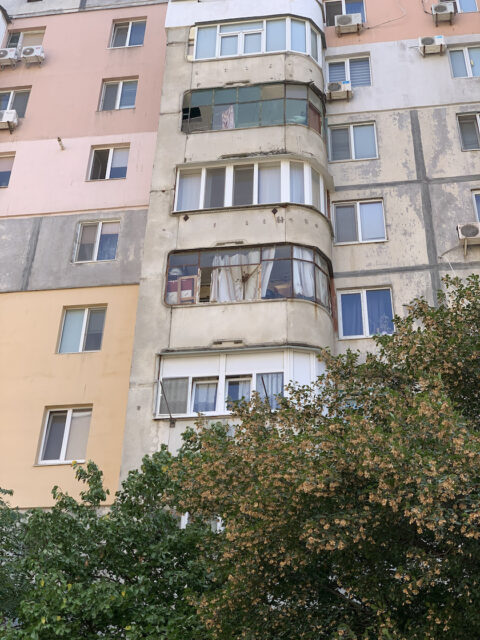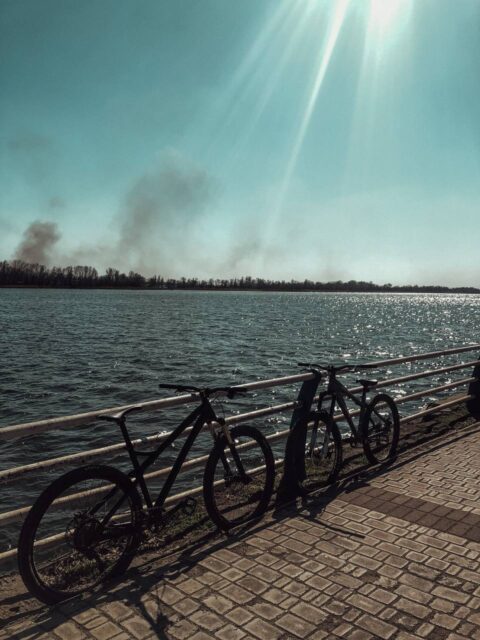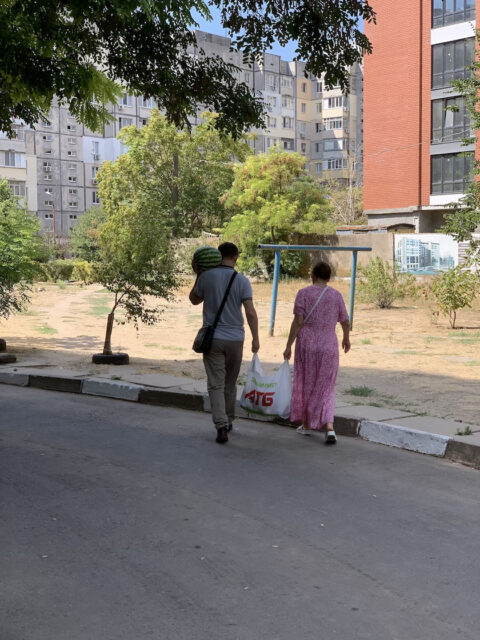Mykyta (name changed for security reasons), a 23-year-old combat medic, continues to serve at one of the Regional Territorial Centers for Recruitment and Social Support despite sustaining injuries. His responsibilities include providing pre-medical assistance at the military enlistment office and offering medical support to families when informing them about the death or disappearance of soldiers. Mykyta’s inspiring story includes a 25-day period of being missing in 2022 and symbolises hope for those waiting for their loved ones to return. In a conversation for The Ukrainian Week, Mykyta shares the account of his escape from occupied Kherson after a severe injury, shedding light on the challenges of informing families about a missing soldier.
***
First encounter with the Russians
– After graduating from Medical College in 2019, I joined the Armed Forces of Ukraine. I became part of the reconnaissance team, serving as a medic in a combat unit. Our commander prepared us for full-scale war, and without him morally breaking us down, we probably wouldn’t have been as resilient.
On February 24, 2022, our unit was set to transition from the southern to the eastern sector, heading into the combat zone to provide support. However, the dynamics of war had shifted. Our presence there became unnecessary. At 5 a.m., a siren abruptly woke us, signalling the enemy’s advancement. Initially, I couldn’t believe it. With six months left on my contract, I questioned: a war now? Checking Telegram confirmed the grim reality—airfields were under attack. Then came a frantic call from my mom in Kyiv, her voice a constant stream of distress. I tried to reassure her, promising it would all be over in a few weeks. Our battalion commander issued orders. We geared up, unaware of the situation elsewhere, and moved forward to confront the advancing enemy.
We were positioned along the highway near Nova Kakhovka, witnessing smoke rising from the city ahead. As we ventured further, the first shells from targeting mortars landed perilously close to us. That moment served as a stark reminder that we were far from any playground. Our mission initially aimed at storming a trench, but then a Russian fighter jet unleashed its attack. Amidst the chaos, there were no clear commands. The pivotal moment for me arrived with the loss of my comrades. One of our medics, Nazar, suffered a devastating injury, his arm ripped off, barely clinging by a thread. The shock of it all hit me like a freight train. Yet, we rallied together, doing our best to assist in any way we could.
The most harrowing moment unfolded under the cover of darkness. By day, Russian forces pinpointed our position with targeted fire, setting the stage for a devastating onslaught come nightfall.
It was the night of February 24th into the 25th. Our trenches were dug knee-deep into the earth. A fellow soldier crawled over to me and murmured, “It’s freezing.” We huddled together, sharing a single cigarette in a feeble attempt to stave off the cold. Then came the illuminating shells, lighting up the night sky and exposing us like sitting ducks. Every detail was starkly visible as if it were broad daylight. I can still hear the cries echoing in my mind. Our plantation was teeming with people, each voice clamouring in unison, “Get out, get out!” Shell after shell rained down, fueling the pandemonium. Equipment was set ablaze, comrades were in a frantic scramble, and the wounded were pleading for aid amidst the chaos.
“Is this it? Is this how it ends?”
– A shell crashed dangerously close to my trench, burying me in a shower of dirt. I was wounded. At first, I brushed it off as merely a concussion. My senses were muddled, akin to a scene from a movie: fluid trickled from my ears, time seemed to slow, and the world around me faded into a deafening silence. I quickly assessed my limbs – they appeared intact. Yet, amidst the relentless explosions, my ears rang incessantly. Amidst the chaos, the anguished cries of my comrades pierced the air, their voices calling out for their mothers. Fear gripped me tightly. I was the sole medic for our unit. Initially, I believed that, given it was a concussion, I could muster the strength to crawl and assist my fellow soldiers within a matter of minutes. But then, a searing pain shot through my shoulder as if it were engulfed in flames. The agony was unbearable. I recalled the commander’s and medic’s warnings about shrapnel and how it burns from within. Yet, I found myself unable to utter a sound, struggling to draw in enough air. It was then that I realised my injuries extended beyond a mere concussion – a chest and shoulder wound and a pneumothorax.
In a state of agony, I dragged myself out of that trench, questioning, “Is this the end?” Blood flowed freely as I continued to crawl; the plantation around me was set on fire. Despite the desperate cries of my comrades, I felt powerless to aid them.

Photo: Anastasia Vararu
A fellow soldier, Vadym, later recounted, “I wanted to shout out to Toraiko, but then you’d get up, clutching your head, and then collapsing again.” There I lay, watching rockets streaking through the sky, with our APC engulfed in flames not far off. Two thoughts raced through my mind: “Either I lose consciousness now and wake up in a hospital, or this is the end.” My mate Stepan pulled me into an APC, and while I remained lucid, I instructed him on what medication to administer. They kept me alert throughout the evacuation process. Upon being transferred to another APC, a rocket struck the turret of the first one just as they moved me. By around seven o’clock, we had retreated a few kilometres. From 7 to 12 in the morning, there was no further evacuation. I lay there in the chilly APC, drenched in my own blood and that of my comrades, while the battle raged on around us. One of the comrades suggested calling for a civilian ambulance from Kherson. Soon enough, it arrived at the front line. I had no idea where they were taking me. They brought me to the hospital. The last thing I recall is the doctor ordering the personnel to inject morphine.
“I fell asleep in Kherson, a city still free, only to awaken to its occupation”
– A week later, I came to my senses in the intensive care unit of Kherson, only to find the city was now under enemy control. My military gear, once a symbol of duty, was discarded, and Stepan claimed my boots, boldly declaring I wouldn’t be needing them anymore. The authorities, in their swift takeover, confiscated every trace of my identity while the city still breathed free air. Upon waking up, I noticed the letter “V” above my bed, puzzled by its significance. My condition was dire—I couldn’t muster the strength to rise, relying on a feeding tube and a tangle of IV lines protruding from my body. Mentally, I have already rehearsed scenarios of their [Russians – ed.] arrival into the ward. But they never went in; they just patrolled the department. When I phoned my mom, I disclosed being wounded in Kherson. She was insisting to come to my rescue. The Russians subjected medical personnel to interrogations, yet no one betrayed us. Wounded Russian soldiers were either housed in other hospitals or in different departments. I spent two and a half months in hospitals before going into hiding in the city. Kherson was entirely unfamiliar to me, and I lacked any friends or at least acquaintances. I maintained constant communication with my father, who, through his connections, arranged for people willing to shelter me at great personal risk. My fellow comrades were dispersed among various families. Russians maintained a tight grip on Kherson. I ventured through the city solely under the guidance of a local, checking in every few days as a precaution.
In Kherson, there was one café where I could get wifi, and I would go there. The atmosphere was oppressive. People tried not to go outside at three in the afternoon.
At that time, the Russians would go out on patrol. If they didn’t like someone, they would take them to the torture chamber. I was living right under their noses.
My apartment was near an intersection where they had set up a communication hub. I tried to go out when no one was around. In the yard, there were elderly women in their 70s who participated in the Russian ‘Victory March’. But over time, I stopped caring even about them. The yard was closed off, with only one entrance and exit.
I remember a time when I was sitting and smoking, and a convoy passed by. A Russian armoured vehicle, Tiger, drove by with a machine gunner sitting inside. Our eyes met, and I continued smoking, feeling intensely paranoid. I lived on the first floor and had removed the mosquito nets from the windows. I also set up traps by the doors so I could quickly leave the apartment if needed. At night, I was always on guard and would fall asleep at dawn.

Photo: Roman Bodnar
Missing for 25 Days
– Initially, I entertained the idea of waiting for Kherson to be liberated by the Ukrainian forces, but eventually, I reached out to the special services. My chances to escape were slim. We spent a long time developing an escape plan. Every day, I checked in and reported what was happening around me. There was always the risk of being intercepted and my location being traced. The escape from Kherson began in early June 2022. I reached Ukrainian-controlled territory in early July. There were several attempts, and the process was delayed.
We received help from civilians, but unfortunately, some of them got captured as a result. Additionally, part of our group that was trying to escape with us also got caught. The first time, we were apprehended by the Russians, and four members of our group were separated from us. The Russians pursued us and even fired at us, but we managed to get away. We crossed the river on a makeshift raft and almost drowned in the process. At that time, my phone was down to 6% battery, but we were still able to establish contact. We were then instructed to go to a different location. While waiting for further instructions, we conducted surveillance and stood guard.
The Russians were continuously monitoring the village in the Kherson region where we were. They even used drones to survey the area. While I was on the lookout, we were camouflaging our boat, and the Russians spotted us with their drone. Before long, an FSB patrol showed up.
Although local people helped us with food along the way, there were also days when we had absolutely nothing to eat or drink. Our group of eight people only had one pack of Mivina instant noodles and two cans of food for us to share.
In total, the escape to Ukrainian-controlled territory took us 25 days. I was considered missing because everything was kept secret. I didn’t even tell my parents that I was leaving Kherson. In the Mykolaiv region, our guys met us.

Photo: Anastasia Vararu
About death and life after
– After that, I continued my struggle, ironically, not on the front lines but with the Military Medical Commission bureaucracy. It took me nearly a year to navigate through it. I received treatment at a psychoneurological clinic and was diagnosed with PTSD. As a result, I was removed from the regular duty roster and started receiving a monthly payment of 700 UAH.
Then, I was transferred to the Lviv Regional Military Medical Centre. My tasks at the military enlistment office included accompanying the major to inform families about the loss or disappearance of their loved ones, aiding soldiers in the security unit, and assisting mobilised individuals brought to the centre. It’s definitely not like being in a combat unit where you’re constantly under threat. But interacting with people every day, many of whom aren’t aware of your background, they still keep sending you to the front. Those kinds of people are the minority; most get what we’re doing. Sadly, the centre’s reputation took a hit because of those who weren’t involved in combat tasks and allowed themselves to overstep boundaries. Now, veterans working there get painted with the same brush. And then there are the troublemakers who, with their loud actions, can easily trigger someone with PTSD. You’ve got to keep your composure because you’re representing the uniform’s honour and strive to stay true. Society often cynically exploits the topic of war and mobilisation at every opportunity. It shouldn’t be like that. We ought to direct all our resources in the right direction.
I handle death notifications with a level head. In most cases, families are already aware of the loss, which makes it somewhat easier. We simply outline the next steps. Words can feel inadequate in such moments, as grief overwhelms the person, and the key is to navigate this with sincerity. Once the initial notification was relatively calm, the woman was already aware of her husband’s passing. The most challenging moment came when we delivered a notification about a person missing in action, and there was a young girl, Sofia. I vividly recall her sitting on the couch, crying, and tenderly caressing his photo on her phone. It struck a chord with me, too.
I’m anxious about spotting a familiar name when I scan through notifications. When it comes to notifications about missing individuals, it’s somewhat easier because there’s still a glimmer of hope.
Drawing from my own experiences, I sometimes share my story with families, knowing that being missing doesn’t necessarily equate to being deceased. However, it’s crucial not to offer false hope; we must discuss the various possible outcomes. With the loss of so many comrades, I’ve come to approach the concept of death differently. If it comes for me, I’ll pass away without realizing it.
I understand that my time in the military is not indefinite. I plan to pursue studies to become a physiotherapist. Our boys need help with rehabilitation.

